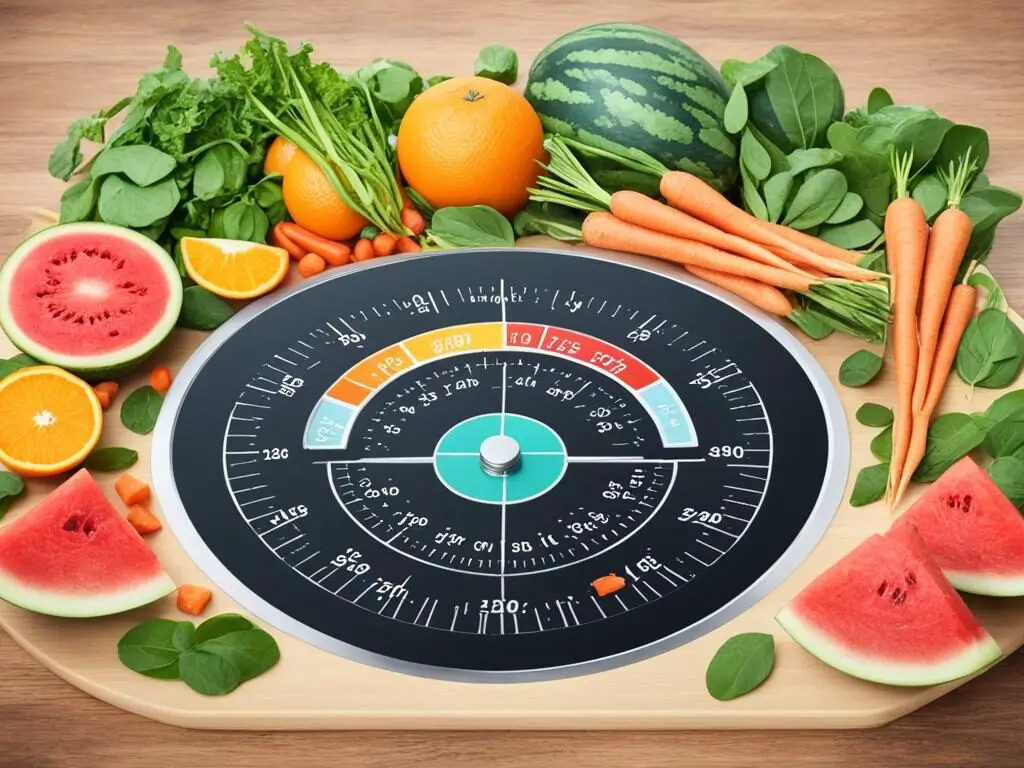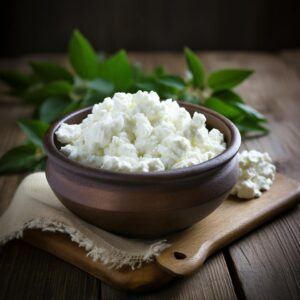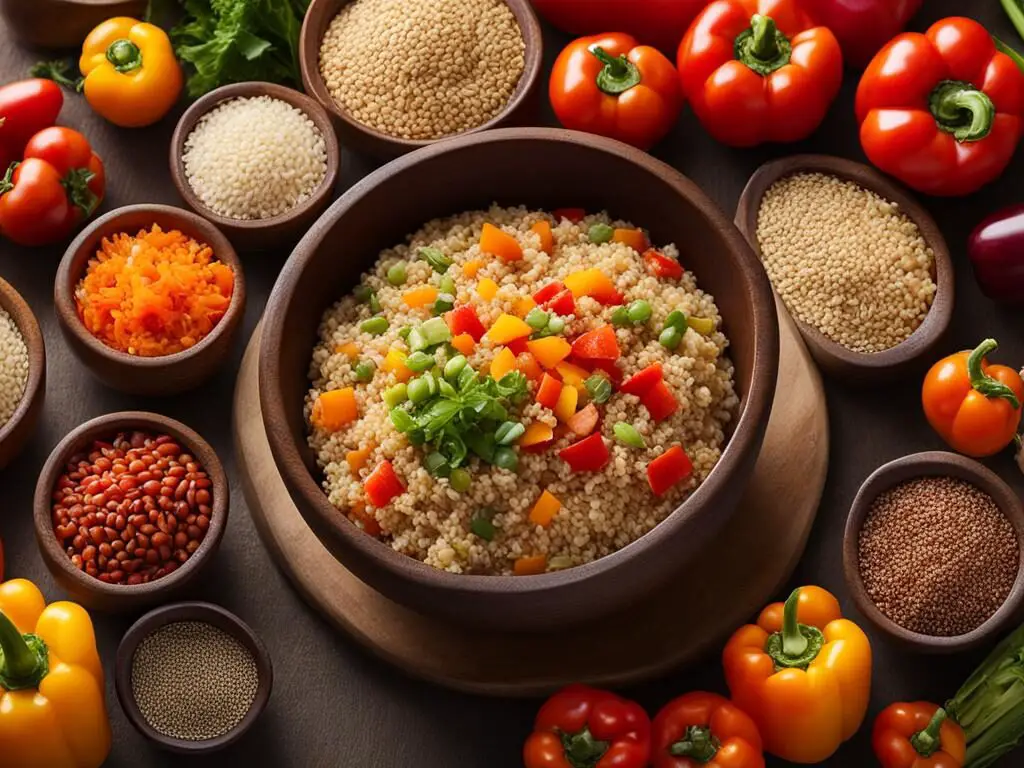Welcome to my guide on the power of a weight loss foods diet! If you’re looking to shed those extra pounds and boost your overall health, incorporating specific foods into your daily eating plan can make a significant difference. In this section, I’ll introduce you to the concept of a weight loss foods diet and highlight the importance of including these best diet plans and healthy foods in your meals. Get ready to nourish your body and watch the scale drop!

The Essential Principles of a Weight Loss Foods Diet
In order to achieve effective weight loss, it is important to follow the essential principles of a weight loss foods diet. These principles are designed to optimize your nutrition and support your weight loss goals. By understanding caloric deficits, nutrient density, protein, fiber, and healthy fats, you can create a balanced eating plan that promotes satiety, hormone balance, and overall cell health.
Understanding Caloric Deficits and Nutrient Density
One of the key principles of a weight loss foods diet is creating a caloric deficit. This means consuming fewer calories than you burn, resulting in weight loss. However, it is equally important to focus on nutrient density. Nutrient-dense foods provide high levels of vitamins, minerals, and other beneficial compounds while being relatively low in calories. By choosing foods that are both low in calories and high in nutrients, you can ensure that you are nourishing your body while promoting weight loss.
The Importance of Protein and Fiber for Satiety
Protein and fiber play crucial roles in supporting satiety and aiding in weight loss. Protein is known for its ability to keep you feeling full and satisfied, reducing the chances of overeating. It also helps to preserve muscle mass during weight loss. Incorporating lean sources of protein, such as chicken, fish, and tofu, into your meals can help you reach your weight loss goals.
Fiber, on the other hand, adds bulk to your diet d slows down digestion, helping you feel fuller for longer. Foods rich in fiber, such as fruits, vegetables, and whole grains, can help control your appetite and prevent overeating. Aim to include a variety of fiber-rich foods in your weight loss foods diet to maximize satiety.
Healthy Fats: Balancing Hormones and Maintaining Cell Health
Healthy fats are an essential part of a weight loss foods diet. They are important for hormone balance and cell health. Incorporating sources of healthy fats, such as avocados, nuts, and olive oil, can help regulate your hormones, improve insulin sensitivity, and support overall cell health. Including a moderate amount of healthy fats in your meals can also enhance the flavor and satisfaction of your diet, making it more sustainable in the long term.
Incorporating Eggs: Nature’s Multivitamin
When it comes to a weight loss foods diet, incorporating eggs can be a game-changer. They are nature’s multivitamin, packed with essential nutrients that support overall health and weight loss goals.
Protein Content and Hormonal Impact on Appetite
Eggs are a fantastic source of high-quality protein, making them an ideal addition to any weight loss plan. Protein is not only crucial for building and repairing tissues but also plays a significant role in appetite regulation.
The protein content in eggs stimulates the release of hormones that promote feelings of fullness, helping to curb cravings and overeating. By including eggs in your meals, you can experience greater satiety and a reduced desire for calorie-dense foods, ultimately supporting weight loss efforts.
The Role of Eggs in Sustained Energy and Metabolic Rate
Incorporating eggs into your weight loss foods diet can also contribute to sustained energy levels and an increased metabolic rate.
The protein and healthy fats found in eggs provide a steady source of energy, helping to prevent energy crashes and keeping you feeling fueled throughout the day. This sustained energy can enhance your ability to engage in physical activity and maintain a consistent exercise routine, further supporting your Body weight loss journey.
Moreover, eggs are known to have a positive impact on metabolic rate. Research suggests that the protein in eggs can boost your metabolism and increase the number of calories your body burns at rest. This can be especially beneficial for weight loss, as a higher metabolic rate means you’re burning more calories throughout the day, even when you’re not active.
So, whether you prefer them boiled, scrambled, or poached, don’t hesitate to incorporate eggs into your weight loss foods diet. They are a versatile and nutrient-packed addition that can power up your weight loss efforts. But remember to eat less and Moderately to achieve the best results!
Focusing on Fiber: The Benevolent Benefits of Leafy Greens
In a weight loss foods diet, one crucial component to focus on is fiber. Leafy greens, in particular, offer a wealth of benevolent benefits that can aid in your weight loss journey.
Leafy greens are packed with high amounts of fiber, providing essential nourishment while keeping calorie intake low. Incorporating leafy greens into your meals can promote feelings of fullness and satiety, which can contribute to greater portion control and reduced calorie consumption.
Not only are leafy greens low in calories, but they also contain a wide range of vitamins, minerals, and antioxidants, ensuring that your body receives the nutrients it needs for optimal health while on a weight loss journey.
Some of the most common leafy greens include spinach, kale, Swiss chard, and arugula. These greens are versatile and can be incorporated into various dishes, such as salads, stir-fries, smoothies, and soups.
“Leafy greens are a nutritional powerhouse, providing an abundance of fiber, vitamins, and minerals to support your weight loss goals.”
By including leafy greens in your weight loss foods diet, you can enjoy their benevolent benefits, boost your fiber intake, and support your overall health and well-being.
| Leafy Green | Fiber Content (per 1 cup) | Calories (per 1 cup) |
|---|---|---|
| Spinach | 4 grams | 7 calories |
| Kale | 2.6 grams | 33 calories |
| Swiss Chard | 3.7 grams | 7 calories |
| Arugula | 0.7 grams | 5 calories |
Leveraging Lean Proteins: The Power of Fish in Your Eating Plan
Incorporating lean proteins into your weight loss foods diet can have significant benefits for your overall health and weight management. One excellent source of lean protein that you should consider adding to your eating plan is fish.

Nutritional Value and Omega-3 Fatty Acids
Fish is not only delicious but also packed with essential nutrients that can support your weight loss efforts. It is a rich source of high-quality protein, which is vital for building and repairing tissues and promoting a feeling of fullness.
One of the standout components of fish is its high content of omega-3 fatty acids. These healthy fats have been linked to numerous health benefits, including reduced inflammation, improved heart health, and enhanced brain function.
The Metabolic Effects of Iodine and Thyroid Function
In addition to its nutritional value, fish can also have metabolic effects that promote weight loss. Certain types of fish, such as cod and tuna, are excellent sources of iodine, a mineral that plays a crucial role in thyroid function.
The thyroid gland is responsible for producing hormones that regulate metabolism. Adequate iodine intake ensures proper thyroid function, which can help optimize your metabolic rate and promote weight loss.
By incorporating fish into your weight loss foods diet, you can leverage the power of lean proteins to support your weight loss goals and improve your overall health.
Cruciferous Vegetables: A Low-Calorie Ally for Feeling Full Longer
Incorporating cruciferous vegetables into your weight loss foods diet can be a game-changer. These nutrient-packed veggies are not only low in calories but also high in fiber and other essential nutrients. Their unique combination of properties makes them the perfect ally for weight loss, keeping you feeling full longer and satisfied after meals.
Cruciferous vegetables include popular options like broccoli, cauliflower, kale, Brussels sprouts, and cabbage. These veggies offer a wide range of health benefits beyond weight loss, such as reducing inflammation, supporting digestion, and boosting immune function.
Cruciferous vegetables are rich in fiber, a type of carbohydrate that the body cannot fully digest. This means that these vegetables pass through the digestive system relatively intact, adding bulk to your diet and promoting feelings of fullness and satiety. By incorporating cruciferous vegetables into your meals, you’re able to enjoy a satisfying and delicious eating experience while reducing your overall calorie intake.
“I love adding roasted Brussels sprouts to my meals. They’re not only flavorful but also help me stay on track with my weight loss goals by keeping me full for longer.” – Jessica, a dedicated weight loss enthusiast.
These veggies also pack a powerful nutritional punch. They are high in vitamins A, C, and K, as well as folate and potassium. The combination of vitamins and minerals found in cruciferous vegetables supports overall health and well-being while aiding in weight loss efforts.
When it comes to cooking cruciferous vegetables, the options are endless. You can enjoy them raw in salads, lightly steamed, roasted, or even sautéed with other delicious ingredients. Experiment with different cooking methods and flavor combinations to find your favorite way to incorporate these low-calorie powerhouses into your weight loss foods diet.
Weight Loss Foods Diet: Optimal Food Choices for Sustainable Weight Management
In order to achieve sustainable weight management, it is crucial to make optimal food choices as part of your weight loss foods diet. Choosing the right foods can not only support your weight loss goals but also ensure long-term success in maintaining a healthy weight. By focusing on whole, nutrient-dense foods and avoiding processed and high-calorie options, you can fuel your body with the necessary nutrients while effectively managing your weight.
When selecting foods for your weight loss diet, prioritize those that are low in calories but high in essential nutrients. Whole grains, lean proteins, fruits, vegetables, and healthy fats should be the foundation of your diet. These foods provide you with a wide range of vitamins, minerals, fiber, and antioxidants that are essential for overall health and weight management.
It is important to note that a weight loss foods diet should not be overly restrictive or eliminate entire food groups. Instead, it should focus on creating a balanced and sustainable eating plan that you can maintain in the long run. Remember that sustainable weight management is about making lifestyle changes and developing healthy eating habits that can be maintained for life.
So, what are some optimal food choices for your weight loss foods diet?
| Food Category | Examples |
|---|---|
| Whole Grains | Brown rice, quinoa, whole wheat bread |
| Lean Proteins | Chicken breast, turkey, tofu, beans |
| Fruits | Apples, berries, oranges |
| Vegetables | Broccoli, spinach, kale |
| Healthy Fats | Avocado, olive oil, nuts |
By incorporating these foods into your weight loss foods diet, you can nourish your body with the necessary nutrients and support your weight management goals. Remember to also practice portion control and listen to your body’s hunger and fullness cues.
Reaping the Rewards of Root Vegetables: A Spotlight on Potatoes
When it comes to weight loss foods, root vegetables deserve a special mention. One vegetable that particularly steals the spotlight is the humble potato. Let’s explore why potatoes are a valuable addition to a weight loss diet and how they can help you achieve your health goals.
Understanding Resistant Starch and Its Effects on Satiety
One of the reasons why potatoes are beneficial for weight loss is their high content of resistant starch. Resistant starch is a type of carbohydrate that resists digestion in the small intestine, reaching the large intestine intact. This unique property offers multiple benefits, including increased satiety.
“Potatoes provide a good source of resistant starch, which helps keep you feeling full and satisfied after a meal.”
By promoting feelings of fullness, resistant starch can help control your appetite, reducing the chances of overeating and snacking on unhealthy foods throughout the day. This makes potatoes an excellent choice for those looking to manage their weight effectively.
How Cooling Potatoes Can Boost Their Health Benefits
Did you know that cooling potatoes after cooking can actually increase their health benefits? When you cool cooked potatoes, they undergo a process called retrogradation, which increases the resistant starch content even further.
Cooling potatoes not only enhances their weight loss properties but also contributes to better blood sugar management. The increased resistant starch levels can help regulate blood sugar levels, making potatoes a suitable option for individuals with diabetes or insulin resistance.
So, go ahead and include potatoes in your weight loss foods diet, whether they’re mashed, roasted, or steamed. Just remember to cool them down before consuming to reap the maximum health benefits.
The Skinny on Dairy: Incorporating Cottage Cheese into Your Healthy Eating Plan
Incorporating dairy products into your weight loss foods diet can be a smart move. One dairy option that deserves a place in your healthy eating plan is cottage cheese. This versatile and nutritious food provides numerous benefits that support your weight loss goals.
Nutritional Benefits of Cottage Cheese:
- Protein Powerhouse: Cottage cheese is packed with high-quality protein, which is essential for building and repairing muscles. Including protein-rich foods like cottage cheese in your diet can help keep you feeling full and satisfied.
- Calcium and Vitamin D: Cottage cheese is a good source of calcium and vitamin D, which are essential for strong bones and teeth.
- Low in Calories: Cottage cheese is relatively low in calories, making it an excellent choice for weight loss. It provides a satisfying, nutrient-dense option without adding excessive calories to your daily intake.
- B vitamins and Minerals: Cottage cheese contains B vitamins, such as riboflavin and vitamin B12, which are necessary for energy production. It also provides essential minerals like phosphorus and selenium.
Now that you know about the nutritional benefits of cottage cheese, let’s explore some creative ways to incorporate it into your healthy eating plan:
- Enjoy it as a Snack: Cottage cheese makes a great snack on its own. Add a sprinkle of black pepper or your favorite herbs and spices for extra flavor.
- Top it with Fruits: Pair cottage cheese with fresh fruits like berries, peaches, or pineapple for a delicious and nutritious snack or dessert.
- Use it in Smoothies: Blend cottage cheese into your favorite smoothie recipes to add creaminess and protein. It will keep you feeling full and satisfied for longer.
- Make it a Savory Topping: Use cottage cheese as a creamy topping for savory dishes like baked potatoes, roasted vegetables, or whole-grain toast.
- Incorporate it into Recipes: Use cottage cheese as a substitute for higher-fat ingredients in recipes like lasagna, pancakes, or dips. It adds creaminess and boosts the protein content of the dish.

By incorporating cottage cheese into your healthy eating plan, you can enjoy its nutritional benefits while working towards your weight loss goals. Get creative and experiment with different ways to add this versatile dairy food to your meals and snacks.
Healthy Eating on the Go: Nuts as a Satiating Snack
Burning Fat with Balanced Snacking
Incorporating healthy snacks into your weight loss foods diet can be a game-changer when it comes to sticking to your goals, especially when you’re on the go. One of the top choices for a quick and satisfying snack is nuts. Not only are they portable and easy to carry, but they are also packed with essential nutrients that support weight loss and overall health.
Choosing the Right Nuts for Omega-3s and Fiber
When it comes to choosing the right nuts for your weight loss journey, it’s important to consider their nutritional content. Nuts high in omega-3 fatty acids and fiber can provide you with a satiating snack that helps control your appetite and burn fat.
Here are some nuts that are rich in omega-3s and fiber:
- Almonds
- Walnuts
- Pistachios
These nuts not only provide healthy fats and fiber but also offer a satisfying crunch that can fulfill your snack cravings. Incorporating a handful of these nuts into your daily routine can help keep you fuller for longer and support your weight loss goals.
So the next time you’re on the go and in need of a quick and healthy snack, reach for a handful of these omega-3 and fiber-rich nuts. They are not only delicious but also a convenient way to keep you on track with your weight loss foods diet.
The Surprising Benefits of Whole Grains in a Weight Loss Diet
When it comes to weight loss, many people think of cutting out grains altogether. However, you may be surprised to learn that whole grains can actually be beneficial for your weight loss journey. Incorporating whole grains into your diet can provide a range of surprising benefits that can support your weight loss goals.
Whole grains, such as brown rice, quinoa, and whole wheat bread, are packed with essential nutrients and fiber. These nutrient-dense foods help to keep you feeling fuller for longer, reducing the likelihood of overeating and snacking on unhealthy foods.
Fiber, in particular, is a key component of whole grains that aids in weight loss. It adds bulk to your meals, making you feel satisfied while providing fewer calories. This can lead to a decreased calorie intake over time, helping you shed those extra pounds.
“Incorporating whole grains into your weight loss diet can provide a range of surprising benefits that can support your weight loss goals.”
| Surprising Benefits of Whole Grains in a Weight Loss Diet |
|---|
| 1. Satiety: Whole grains keep you feeling fuller for longer, reducing the urge to overeat. |
| 2. Fiber: The fiber content in whole grains aids in digestion and helps regulate blood sugar levels. |
| 3. Nutrient Density: Whole grains are rich in essential vitamins and minerals, providing a nutrient-packed addition to your diet. |
| 4. Energy Boost: The complex carbohydrates in whole grains provide a sustained release of energy, keeping you fueled throughout the day. |
In addition to their weight loss benefits, whole grains are also known for their positive impact on overall health. They can help lower the risk of heart disease, certain types of cancer, and other chronic conditions.
To incorporate more whole grains into your weight loss diet, try replacing refined grains, such as white pasta and white bread, with their whole grain counterparts. Opt for whole wheat versions of your favorite baked goods and experiment with different types of whole grains like quinoa, barley, and oats.
Remember, moderation is key. While whole grains offer numerous benefits, it’s important to maintain a balanced diet that includes a variety of foods. Consult with a healthcare professional or registered dietitian to determine the ideal portion sizes and the best way to incorporate whole grains into your individual weight loss plan.

Key Takeaways:
- Eating the right foods can have a major impact on weight loss.
- A weight loss foods diet focuses on incorporating specific foods into your daily meals.
- By including these foods in your diet, you can improve your overall health and watch the scale drop.
- Stay tuned as we explore the essential principles of a weight loss foods diet and provide practical tips for incorporating these foods into your meals.
Conclusion
In Summary, adopting a weight loss foods diet can be a powerful strategy for achieving and maintaining a healthy weight. By combining the recommended foods, you can maximize the benefits of weight loss and improve your overall well-being.
One of the key principles of a successful weight loss foods diet is to adopt a balanced approach. This means incorporating a variety of nutrient-dense foods into your meals and avoiding processed and high-calorie options. By focusing on whole, unprocessed foods, you can ensure that your body is receiving the necessary nutrients while promoting weight loss.
However, it’s important to remember that sustainable weight management is not just about the foods you eat, but also about the choices you make on a daily basis. Consistency is key, and making mindful choices consistently can lead to long-term success in maintaining a healthy weight.
By prioritizing the right food choices, you can enhance your weight loss journey. Be sure to consult with a healthcare professional or registered dietitian for personalized advice and guidance on incorporating a weight loss foods diet into your lifestyle.
FAQ
What is a weight loss foods diet?
A weight loss foods diet is an eating plan that focuses on incorporating specific foods known for their ability to help you lose weight. These foods are low in calories but high in nutrients, which can help you feel full and satisfied while consuming fewer calories.
What are the essential principles of a weight loss foods diet?
The essential principles of a weight loss foods diet include understanding caloric deficits and nutrient density, prioritizing protein and fiber for satiety, and incorporating healthy fats for hormone balance and cell health.
Why are eggs important in a weight loss foods diet?
Eggs are nature’s multivitamin! They are packed with protein, which can help regulate appetite and keep you feeling full. Additionally, eggs can contribute to sustained energy levels and a higher metabolic rate.
How do leafy greens benefit weight loss?
Leafy greens are an excellent source of fiber, which promotes feelings of fullness and satiety. They are also low in calories, making them a great addition to a weight loss foods diet.
What makes fish a valuable inclusion in a weight loss foods diet?
Fish is a lean protein that offers many nutritional benefits. It is a rich source of omega-3 fatty acids, which can support weight loss efforts. Additionally, fish plays a role in iodine and thyroid function, which can help support a healthy metabolism.
How can cruciferous vegetables aid in weight loss?
Cruciferous vegetables, such as broccoli and cauliflower, are low in calories but high in volume and nutrients. They can help you feel full and satisfied while consuming fewer calories, making them a helpful ally for weight loss.
What are optimal food choices for a weight loss foods diet?
Optimal food choices for a weight loss foods diet include whole, nutrient-dense foods. It is important to choose foods that are minimally processed and low in calories, while still providing a range of essential nutrients to support overall health.
How can potatoes be beneficial in a weight loss foods diet?
Potatoes, particularly when cooled, contain resistant starch, which can promote satiety and help you feel fuller for longer. They can be a healthy addition to a weight loss foods diet when consumed in moderation.
Why is cottage cheese a good dairy option for a weight loss foods diet?
Cottage cheese is a nutrient-dense food that is low in calories and high in protein. It can be a satisfying addition to a healthy eating plan, providing essential nutrients while helping you feel full and satisfied.
How can nuts contribute to weight loss?
Nuts are a satiating snack option that can help you feel full and prevent overeating. They are rich in healthy fats, fiber, and protein, which can support weight loss and balanced snacking. Choosing nuts high in omega-3s and fiber can provide additional benefits.
Are whole grains beneficial for weight loss?
Yes, whole grains can be a valuable part of a weight loss diet. They are rich in fiber and nutrients, which can promote feelings of fullness and provide a range of health benefits. Opt for whole grain options instead of refined grains for maximum nutritional value.